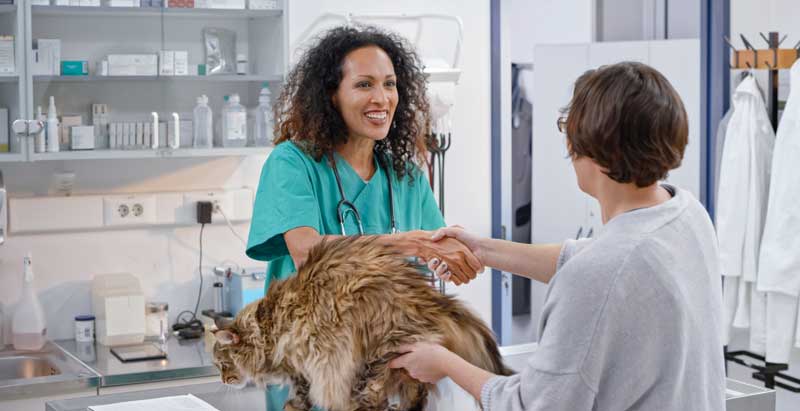Whether in the city, the country, or somewhere in between, independent veterinary practices play an important role in communities by providing pet parents and their beloved animals access to pet healthcare. Often, these practices service in specific geographic regions—“veterinary care deserts”—where pet healthcare is limited.
One of the critical strengths of independent practices is developing close relationships with clients to create treatment protocols tailored to the pet’s needs and the client’s budget. They are able to ensure clients are given a choice and catered to with flexibility.
Today’s savvy pet parents are discerning and often choose independent veterinary practices due to their location and the personalized quality of their services. The small-business veterinarian’s identity is intertwined with the level of service they provide. If pet parents and veterinary clinicians share the same values around animal wellness, medical services, and costs, it is more likely a harmonious relationship will develop.
Personalization is key
Communication and relationship-building are critical in establishing trust between veterinarians and pet parents. Often, clients turn to independent veterinary clinics for a more personalized and attentive approach to pet care as they have the flexibility to tailor their services to the specific needs of each animal, without the constraints of corporate protocols.
As a result, these vets can work with clients to create a personalized and comprehensive care plans to address individual needs and preferences. For example, some pet parents seek the same treatments for their pets they receive themselves, including integrative medicine and holistic and alternative therapies, such as acupuncture.
Part of a personalized approach is also rooted in providing access to knowledge. Pet parents are increasingly looking to their veterinarians for information and resources on how best to keep their pets healthy and happy to strengthen their relationship with their companion animals, according to the Human Animal Bond Research Institute (HABRI).1 Clients want details on tailored wellness plans, nutrition recommendations, and alternative therapies—as well as transparency in treatment options, expected outcomes, and costs. Offering information around these details will go a long way to becoming a trusted resource, empowering clients to make informed healthcare decisions.
At its best, an independent veterinary practice is the personalized collaboration between pet parent and practitioner working toward a common goal: keeping animals healthy and happy. Be receptive to having a conversation to understand the style of care your client wants for their animal. Have your clients share their personal views about what type of care should be delivered. For example, the client may prefer an emphasis on Eastern philosophies of medicine such as naturopathy, homeopathy, and herbal medications. It is essential to see if the requirements match your specialty, style, and modality of therapy. Then, you will be more in sync with your clients regarding philosophy, medical style, morals, and ethics—and the care you provide.
Offering flexibility
There is a lot of diversity in how pet parents think their pets should be cared for. Some believe their animals should receive the same care as they—the parents—receive. Others may put more consideration on budget and the type of care they can afford. Veterinarians often get stuck in the middle, which is why independent veterinarians should consider offering a spectrum of care where possible.
A spectrum of care can provide clients more flexibility in choosing how they can meet their pet’s medical needs. Further, pet parents can maintain their pet’s quality of life within a budget, decide within their morals, and not just have a low- and high-tier care solution to choose from.
With the wide array of treatment options available today, the spectrum of care is continuing to grow and should be considered for patients, while also ensuring it meets the veterinarian’s moral, ethical, and legal requirements.
However, even with a spectrum of care, the cost of pet care is rising. A recent study found the lifetime pet healthcare costs are on average upwards of $55,000 for dogs and $45,000 for cats, with healthcare costs for horses exponentially higher.2 To address costs, small-business veterinarians are implementing flexible payment options—such as payment plans, and pet insurance—to deliver the kind of care they can feel good about and help ease the financial burden for their clients.
Today’s clients expect flexible payment options to allow them to choose quality care without depleting personal finances. Payment plans are also a way to educate pet parents about their need to budget for the cost of care. The opportunity to be proactive and help clients be more prepared for the financial care part of their visit, in advance of their appointment, is valuable. It can ultimately help minimize the stressful moment where economics and emotions can meet in the exam room, when the diagnosis and treatment plan cost are presented can be very stressful for both the client and practice team member alike.
Some practices offer flexible payment plans that allow clients to spread the cost of expensive surgeries or treatments over several months, making it more manageable for clients to budget. Credit cards targeted for pet care can be used for routine veterinary appointments, emergency pet care, grooming services, treatments, and surgeries. They enable clients to stretch out the cost of care without worrying about incurring additional charges that can often come from standard high-interest credit cards. Another option is pet insurance, which can help cover the costs associated with pet accidents, illnesses, and routine care.
Establishing trust, empathy, flexibility, and personalized connections with pet parents has deep historical roots. Veterinarians who take the time to understand not just the animals’ medical concerns, but also their human companions’ concerns and emotions continue the longstanding tradition of compassionate care. We live in a world where businesses of all sizes are seeking to reengage and connect. To be successful, implementing old tricks is suddenly new again.
Bonnie Bragdon, DVM, MS, is the co-founder and president of the Independent Veterinary Practitioners Association. Boo Larsen is senior vice president and general manager, Veterinary and Pet Care at Synchrony.
References
- HABRI. “HABRI Benchmark Survey of U.S. Pet Owners.” habri.org/pet-owners-survey/
- Synchrony. “Lifetime of Care Study.” petlifetimeofcare.com/




